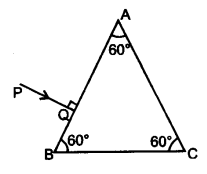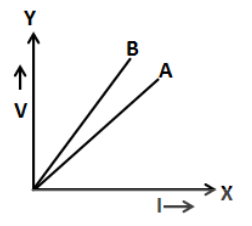|
SECTION-I (40 Marks)
Attempt all question from this Section.
|
|
|
1.
|
|
|
|
a)
|
|
2
|
|
i.
|
Give an example of a non contact force which is always of attractive nature.
|
|
|
ii.
|
How does the magnitude of this non contact force on the two bodies depend on the distance of separation between them?
|
|
|
b)
|
A boy weighing $40 mathrm{kgf}$ climbs up a stair of 30 steps each $20 mathrm{~cm}$ high in 4 minutes and a girl weighing $30 mathrm{kgf}$ does the same in 3 minutes. Compare:
|
2
|
|
i.
|
The work done by them.
|
|
|
ii.
|
The power developed by them.
|
|
|
c)
|
With reference to the terms Mechanical Advantage, Velocity Ratio and efficiency of a machine, name and define the term that will not change for machine of a given design.
|
2
|
|
d)
|
Calculate the mass of ice required to lower the temperature of $300 mathrm{~g}$ of water $40^{circ} mathrm{C}$ to water at $0^{circ} mathrm{C}$.
(Specific latent heat of ice $=336 mathrm{~J} / mathrm{g}$, Specific heat capacity of water $left.=4.2 mathrm{~J} / mathrm{g}^{circ} mathrm{C}right)$
|
2
|
|
e)
|
What do you understand by the following statements:
|
2
|
|
i.
|
The heat capacity of the body is 60$] mathrm{K}^{-1}$.
|
|
|
ii.
|
The specific heat capacity of lead is $130 mathrm{Jkg}^{-1} mathrm{~K}^{-1}$.
|
|
|
2.
|
|
|
|
a)
|
State two factors upon which the heat absorbed by a body depends.
|
2
|
|
b)
|
A boy uses blue colour of light to find the refractive index of glass. He then repeats the experiment using red colour of light. Will the refractive index be the same or different in the two cases? Give a reason to support your answer.
|
2
|
|
c)
|
Copy the diagram given below and complete the path of the light ray till it emerges out of the prism. The critical angle of glass is $42^{circ} .$ In your diagram mark the angles wherever necessary.

|
2
|
|
d)
|
State the dependence of angle of deviation:
|
2
|
|
i.
|
On the refractive index of the material of the prism.
|
|
|
ii.
|
On the wavelength of light
|
|
|
e)
|
The ratio of amplitude of two waves is $3: 4 .$ What is the ratio of their:
|
2
|
|
i.
|
loudness?
|
|
|
ii.
|
Frequencies?
|
|
|
3.
|
|
|
|
a)
|
State the ways by which the frequency of transverse vibrations of a stretch string can be increased.
|
2
|
|
b)
|
What is meant by noise pollution? Name one source of sound causing noise pollution.
|
2
|
|
c)
|
The V-I graph for a series combination and for a parallel combination of two resistors is shown in the figure below. Which of the two $A$ or $B$. represents the parallel combination? Give reasons for your answer.

|
2
|
|
d)
|
The music system draws a current of $400 mathrm{~mA}$ when connected to a $12 mathrm{~V}$ battery.
|
2
|
|
i.
|
What is the resistance of the music system?
|
|
|
ii.
|
The music system if left playing for several hours and finally the battery voltage drops to $320 mathrm{~mA}$ and the music system stops playing when the current.
|
|
|
e)
|
Calculate the quantity of heat produced in a $20 Omega$ resistor carrying $2.5 mathrm{~A}$ current in 5 minutes.
|
2
|
|
4.
|
|
|
|
a)
|
State the characteristics required of good thermion emitter.
|
2
|
|
b)
|
An element ${ }_{z} mathrm{~S}^{mathrm{A}}$ decays to ${ }_{85} mathrm{R}^{222}$ after emitting $2 alpha$ particles and $1 beta$ particle. Find the atomic number and atomic mass of the element $mathrm{S}$.
|
2
|
|
c)
|
A radioactive substance is oxidized. Will there be any change in the nature its radioactivity? Give a reason for your answer.
|
2
|
|
d)
|
State the characteristics required in a material to be used as an effective fuse wire.
|
2
|
|
e)
|
Which coil of a step up transformer is made thicker and why?
|
2
|
|
SECTION – II (40 Marks)
Attempt any four questions from this Section.
|
|
|
5.
|
|
|
|
a)
|
A stone of mass ‘ $mathrm{m}^{prime}$ is rotated in a circular path with a uniform speed by tying a strong string with the help of your hand. Answer the following questions:
|
|
|
i.
|
Is the stone moving with a uniform or variable speed?
|
|
|
ii.
|
Is the stone moving with a uniform acceleration? In which direction does the acceleration act?
|
|
|
iii.
|
What kind of force acts on the hand and state its direction?
|
|
|
b)
|
From the diagram given below. answer the question that follow:

|
|
|
i.
|
What kind of pulleys are $A$ and $B$ ?
|
|
|
ii.
|
State the purpose of pulley $mathrm{B}$.
|
|
|
iii.
|
What effort has to be applied at $C$ just raise the load $L=20 mathrm{~kg}$ ? (Neglect the weight of pulley A and friction)
|
|
|
6.
|
|
|
|
a)
|
|
|
|
i.
|
What is the principle of method of mixtures?
|
|
|
ii.
|
|
|
iii.
|
Name the law on which the principle is based
|
|
|
b)
|
Some ice is heated at a constant rate, and its temperature is recorded after every few seconds, till steam is formed at $100^{circ} mathrm{C}$. Draw a temperature time graph to represent the change. Label the two phase changes in your graph.
|
|
|
c)
|
A copper vessel of mass $100 mathrm{~g}$ contains $150 mathrm{~g}$ of water at $50^{circ} mathrm{C}$. How much ice is needed to cool it to $5^{circ} mathrm{C} ?%%EDITORCONTENT%%nbsp;
Given: Specific heat capacity of copper $=0.4 mathrm{Jg}^{-10} mathrm{C}^{-1}$ Specific heat capacity of water $=4.2 mathrm{Jg}^{-1}{ }^{circ} mathrm{C}^{-1}$ Specific latent heat of fusion ice $=336 mathrm{Jg}^{-1}$
|
|
|
7.
|
|
|
|
a)
|
|
|
|
i.
|
Write a relationship between angle of incidence and angle of refractions for a given pair of media.
|
|
|
ii.
|
When a ray of light enters from one medium to another having different optical densities it bends. Why does this phenomenon occur?
|
|
|
iii.
|
Write one conditions where it does not bend when entering a medium of different optical density.
|
|
|
b)
|
A lens produces a virtual image between the object and the lens.
|
|
|
i.
|
Name the lens.
|
|
|
ii.
|
Draw a ray diagram to show the formation of this image.
|
|
|
c)
|
What do you understand by the term’ Scattering of light’? Which colour of white light is scattered the least and why?
|
|
|
8.
|
|
|
|
a)
|
|
|
|
i.
|
Name the waves used for echo depth sounding.
|
|
|
ii.
|
Give one reason for their use for the above purpose.
|
|
|
iii.
|
Why are the waves mentioned by you not audible to us?
|
|
|
b)
|
|
|
|
i.
|
What is an echo.
|
|
|
ii.
|
State two conditions for an echo to take place.
|
|
|
c)
|
|
|
|
i.
|
Name the phenomenon involved in tunning a radio set to a particular station.
|
|
|
ii.
|
Define the phenomenon named by you in part (i) above.
|
|
|
iii.
|
What do you understand by loudness of sound?
|
|
|
iv.
|
In which units is the loudness of sound measured?
|
|
|
9.
|
|
|
|
a)
|
|
|
|
i.
|
Which particles are responsible for current in conductors?
|
|
|
ii.
|
To which wire of a cable in a power circuit should the metal case of a geyser be connected?
|
|
|
iii.
|
To which wire should the fuse be connected?
|
|
|
b)
|
|
|
|
i.
|
Name the transformer used in the power transmitting station of a power plant.
|
|
|
ii.
|
What type of current is transmitted from the power station?
|
|
|
iii.
|
At what voltage is this current available to our household?
|
|
|
c)
|
A battery of emf $12 mathrm{~V}$ and internal resistance $2 Omega$ is connected with two resistors $A$ and $B$ of resistance $4 Omega$ and $6 Omega$ respectively joined in series.

Find:
|
|
|
i.
|
Current in the circuit
|
|
|
ii.
|
The terminal voltage of the cell.
|
|
|
iii.
|
The potential difference across $6 Omega$ Resistor.
|
|
|
iv.
|
Electrical energy spent per minute in $4 Omega$ resistor.
|
|
|
10.
|
|
|
|
a)
|
Arrange $alpha, beta$, and $gamma$ rays in ascending order with respect to their
|
|
|
i.
|
Penetrating power.
|
|
|
ii.
|
Lionising power.
|
|
|
iii.
|
Biological effect.
|
|
|
b)
|
|
|
|
i.
|
In a cathode ray tube what is the function of anode?
|
|
|
ii.
|
State the energy conversion taking place in a cathode ray tube.
|
|
|
iii.
|
Write one use of cathode ray tube.
|
|
|
c)
|
|
|
|
i.
|
Represent the change in the nucleus of a radioactive element when a $beta$ particle is emitted.
|
|
|
ii.
|
What is the name given to elements with same mass number and different atomic number.
|
|
|
iii.
|
Under which conditions does the nucleus of an atom tend to radioactive?
|
|


